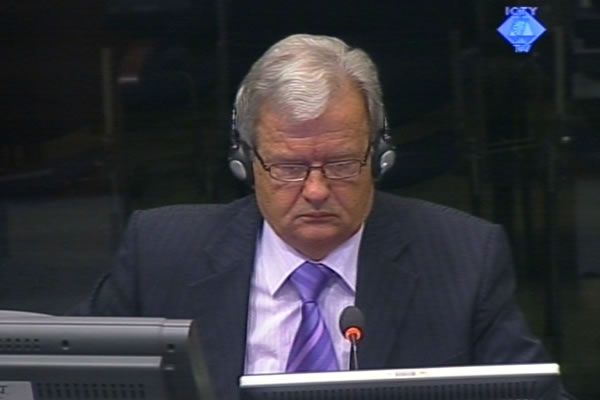Home
WHY KARADIC DECLARED STATE OF WAR IN SREBRENICA
In the course of the evidence of General Petar Skrbic, the prosecution insisted that former Republika Srpska president Radovan Karadzic had declared the state of war in Srebrenica on 14 July 1995. According to the prosecution, Karadzic did it in order to allow the army to requisition bulldozers and backhoes needed to dig mass graves where thousands of executed prisoners were buried at that time
 Petar Skrbic, witness at the Radovan Karadzic trial
Petar Skrbic, witness at the Radovan Karadzic trial In his evidence at the trial of Radovan Karadzic, former VRS general Petar Skrbic confirmed that in the evening of 11 July 1995 he received an order from the commander of the Main Staff, Ratko Mladic, ordering him to provide buses which were to go to Bratunac to ‘evacuate the people’. Obeying the order, the witness got in touch with the RS Ministry of Defense that same night and the next morning, he submitted his request to the Ministry in writing.
In the examination-in chief, prosecutor Alan Tieger brought up several documents about the implementation of Mladic’s order, and Karadzic’s decision of 14 July 1995 declaring the state of war in the area of Srebrenica-Skelani. As Skrbic said, he didn’t understand why the state of war was declared on that very day and only in that part of Republika Srpska. Skrbic agrees that declaring the state of war allowed the army to requisition all the necessary resources, including bulldozers and backhoes at any time.
Skrbic also confirmed that on 14 July 1995, he personally brought to the office of the Republika Srpska president the decrees promoting and retiring of Milenko Zivanovic and appointing Radislav Krstic the commander of the VRS Drina Corps for Karadzic to sign. Videos of the formal handover ceremony in the restaurant Kod Jele in the presence of General Mladic were shown in the courtroom. Responding to the congratulations on the capture of Srebrenica, Krstic said he ‘will go towards new victories in the effort to create a united Serb state’.
In the cross-examination, Karadzic tried to prove that Mladic sent his order to requisition the buses ‘late in the night’ of 11 July 1995. The witness remained adamant that he had received the call ‘at dusk’. As it was summertime, the call could have come in a bit later than 8pm. Karadzic also put it to the witness that the state of war was only declared in some parts of the RS ‘as an extreme measure’. In the case of Srebrenica, there may have been reasons the witness didn’t have to know, Karadzic noted.
The prosecution’s closing arguments at the trial of Vojislav Seselj prompted Karadzic to urge the Trial Chamber to take into consideration the broader context of the conflict in the former Yugoslavia. Karadzic explained that it was not the case of ‘some wild Serbs leaping on their neighbors just like that’; in fact, they ‘reacted to what the others did’, ‘to the rhetoric and insignia from World War II, which the Serbs found terrifying’. Karadzic also insisted that the Serbs were the last ethnic community to establish its party, the SDS, in BH before the conflict. He was the last politician to enter the scene and the Serb people started putting together their military after all the other ethnicities had already done it, Karadzic said.
In the re-examination, the prosecutor said that the SDS in BH, headed by Karadzic, took steps to remind the Serb people of the crimes against Serbs in World War II. The prosecutor corroborated his claim with an interview in which former VRS information minister Velibor Ostojic says that the reminder was to serve as a warning against any misconceptions about co-existence with the enemy. The SDS was ready to mount the defense and the Serb people were ‘for the first time better prepared than the enemy’, Ostojic said.
In response to Karadzic’s questions, the witness recalled that the accused once said in public that Mladic had become a living legend but that there were other generals who deserve to be commended. The prosecution jumped at the chance to play a recording of an interview Karadzic gave on 4 August 1995. In the interview, Karadzic says that Krstic made the plans for the Srebrenica operation in Karadzic’s presence and that he, Karadzic, personally gave the go-ahead for the task.
Radovan Karadzic’s trial continues on Monday, 12 March 2012.
Linked Reports
- Case : Karadzic
- 2012-03-07 WITNESS: KARADZIC TOLD ME HE HAD ORDERED THE CAPTURE OF SREBRENICA
- 2012-03-06 KARADZIC: SREBRENICA INVESTIGATION WAS ‘SLOPPY’
- 2012-03-05 KARADZIC AND MILOVANOVIC SHARE ‘TRUTHS AND MISCONCEPTIONS’
- 2012-03-12 KARADZIC: WE RAN THE STATE FROM A FIELD
- 2012-03-13 PIROCANAC BACK IN THE HAGUE
- 2012-03-15 INTERCEPTED CONVERSATIONS ABOUT SREBRENICA
